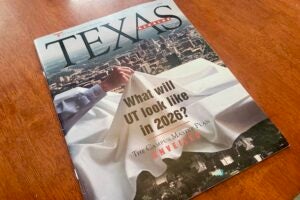AUSTIN, Texas — Eight faculty members from The University of Texas at Austin have been selected by the National Science Foundation (NSF) to receive Faculty Early Career Development (CAREER) Awards totaling more than $2 million. The awards are the most prestigious offered by the NSF’s CAREER Program.
This year, six faculty members from the Cockrell School of Engineering and two faculty members from the College of Natural Sciences will receive funding for innovative projects on topics ranging from solar cells to autonomous systems.
The awards provide up to five years of funding to junior faculty who exemplify the role of teacher-scholars through outstanding research, excellent education and the integration of education and research within the context of their organizations’ missions.
These eight UT Austin faculty members received awards:
Vaibhav Bahadur, assistant professor of mechanical engineering, was awarded for his project “Influence of electric fields on liquid-to-solid phase change associated with clathrate hydrate formation.” The goal of Bahadur’s work is to improve the understanding of hydrates — ice-like materials that form under cold, high-pressure conditions — and to enable the development of new disruptive technologies in energy and water.
Milos Gligoric, assistant professor of electrical and computer engineering, was awarded for “Advancing Regression Testing: Theory and Practice.” Software projects constantly evolve, despite the risk of introducing new bugs, due to endless requirement changes. Gilgoric’s research has the potential to substantially reduce the cost of software testing, which will reduce financial losses and casualties due to software bugs.
Jenny Jiang, assistant professor of biomedical engineering, was awarded for her project “Systems Immunology Approach to Memory T Cell Immune Engineering.” Jiang and her team aim to combine several recently developed technologies in T cell profiling to systematically study the role of the microRNA regulatory network in engineering memory T cells, which could provide new tools for immunotherapy.
Andrew Potter, assistant professor of physics, was awarded for “Non-equilibrium Quantum Dynamics, Topology, and Criticality.” The award will support theoretical research and education toward understanding and controlling the dynamics of complex quantum systems. Potter was part of a team that successfully built the world’s first “time crystal,” an exotic phase of matter in which atoms move in a pattern that repeats in time rather than in space.
Sean Roberts, assistant professor of chemistry, was awarded for his project “Tracking Charge and Energy Transfer at Buried Organic Interfaces.” The funding will support research on the electrical properties of the surfaces of thin materials, which has long-range potential to inspire more energy efficient solar cells, lighting and electronic displays. Roberts is developing an imaging technique known as Electronic Sum Frequency Generation.
Lea Hildebrandt Ruiz, assistant professor in the McKetta Department of Chemical Engineering, was awarded for her project “Air-Quality Effects of Atmospheric Chlorine Chemistry.” Her project includes laboratory experiments, ambient measurements and modeling studies to investigate the role of chlorine chemistry in the formation of particulate matter and ozone in ambient air. Results from this project can be used in air quality models to make more informed decisions about environmental policies.
David Soloveichik, assistant professor of electrical and computer engineering, was awarded for his project “Robust Molecular Computation: Error-Correcting Reaction Network and Leakless DNA Circuits.” Programmable chemical reactions could be useful for a range of applications in manufacturing, chemical sensing and medicine. For example, “smart drugs” that target drug activity to disease cells and activate in response to specific molecular clues would have minimal side effects and improve therapeutic outcomes.
Ufuk Topcu, assistant professor of aerospace engineering and engineering mechanics, was awarded for his project “Provably Correct Shared Control for Human-Embedded Autonomous Systems.” Establishing provable trust is one of the most pressing bottlenecks in deploying autonomous systems at scale. Topcu’s project will help develop autonomous systems in which the human operator and autonomy protocols are equally essential components of the same system and reduce the so-called “automation surprises.”




